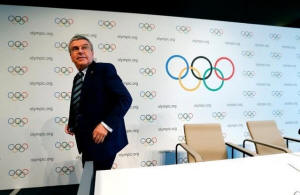|
IOC
'reluctant' to ban Russian team from Olympics: Pound
 Send a link to a friend
Send a link to a friend
 [July 20, 2016]
(Reuters) - The IOC seems
reluctant to ban the entire Russian team from next month's Olympic
Games, despite mounting concern over doping violations, the
co-author of the report that led to Russia's ban from track and
field events said on Wednesday. [July 20, 2016]
(Reuters) - The IOC seems
reluctant to ban the entire Russian team from next month's Olympic
Games, despite mounting concern over doping violations, the
co-author of the report that led to Russia's ban from track and
field events said on Wednesday.
The McLaren report on Russian doping, published on Monday, revealed
evidence of a systematic and widespread state-sponsored doping by
Russian athletes at the 2014 Sochi Winter Olympics.
That led to World Anti-Doping Agency WADA recommending that the
International Olympics Committee and International Paralympic
Committee consider banning all athletes entered by the Russian
Olympic Committee for next month's Olympics in Rio de Janeiro.
But Dick Pound, who was WADA's first president, said he feared the
IOC was loath to take such a step, leaving doubts over any athlete
participating under the Russian flag.

"I do get the impression, reading between the lines, that the IOC is
for some reason very reluctant to think about the total exclusion of
the Russian team," Pound said in an interview on the BBC Radio 4
Today program.
Russia's participation in the Rio Olympics is hanging in the balance
after the IOC said on Tuesday it would "explore legal options" for
banning the country from the Games.
The Court of Arbitration for Sport (CAS) is set to make a separate
ruling on Thursday on whether 68 Russian track and field athletes
should be allowed to compete in Rio.
Pound felt the clean athletes in Russia would suffer as the systemic
state-sponsored doping in the country would make it very hard to
determine whether any Russian athlete was clean.
[to top of second column] |

International Olympic Committee (IOC) President Thomas Bach leaves a
news conference after the Olympic Summit on doping in Lausanne,
Switzerland, June 21, 2016. REUTERS/Denis Balibouse

"There may or may not be clean Russian athletes, but if you look at
the McLaren report it is pretty clear it was endemic," Pound said.
"It was a government-instituted program and every doping test was
scanned to make sure there wasn't a positive -- and if it happened
to be a Russian athlete who had a positive test, it disappeared and
it was replaced by a negative test.
"It is going to be very hard to satisfy anybody that someone in that
system who is at a level that gets him or her to an Olympic Games is
in fact clean."
(Reporting by Shravanth Vijayakumar in Bengaluru,; Editing by
Neville Dalton)
[© 2016 Thomson Reuters. All rights
reserved.]
Copyright 2016 Reuters. All rights reserved. This material may not be published,
broadcast, rewritten or redistributed.

 |